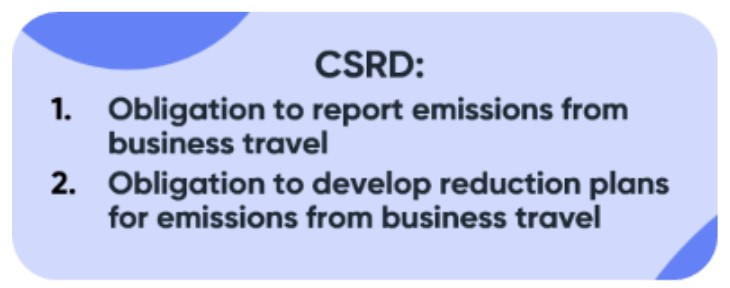Best practices in focus: What the CSRD brings about for companies.
To achieve the ambitious goal of being climate-neutral by 2050, the European Union (EU) is increasingly exerting pressure and calling on companies to disclose their carbon reduction measures and climate strategies. This ensures that the sustainability commitment of companies becomes transparent, measurable, and above all, comparable. These goals have been anchored in a new directive, the Corporate Sustainability Reporting Directive (CSRD). Due to the profound changes brought about by the CSRD, experts advise early preparation. Given the plethora of contributions about the upcoming changes, we have attempted to summarize the most important points regarding the business travel landscape for you.
What is the CSRD and who does it affect?
The CSRD has been in force since the beginning of 2023 and significantly increases the requirements for corporate sustainability reporting. Thus, the CSRD affects not only large companies based or operating in the EU but also their suppliers and business partners. The number of companies now required to publish comprehensive information about their environmental impacts, including emissions from business travel, and sustainability practices has significantly increased. While previously about 11,700 companies were obligated to report, there are now over 49,000. This change is due to the concept of double materiality, which requires companies to assess both the impacts of their activities on the environment – such as emissions caused by business travel – and the effects of environmental changes on their business strategies, obliging them to make these transparent1.
The most significant innovation introduced by the CSRD is that companies are required to set concrete targets for reducing their business travel emissions as part of their climate neutrality goals. These targets must be defined for 2025, 2030, and 2050, and be underpinned by specific measures2. Furthermore, a uniform standard is set to make the disclosure of emissions from business travel truly measurable and comparable.

How does the CSRD affect Travel Management?
As companies must report and actively reduce emissions from business travel from 2024/25 onward, it becomes much easier to compare the progress of companies towards their target of achieving climate neutrality. This means concrete disadvantages in financial and capital markets for companies that perform worse than their competitors. In addition, there are looming penalties for failing to meet climate targets. It can be assumed that the CSRD will fundamentally change the way companies travel.
To ensure a stronger integration of sustainability aspects into travel programs, companies must be able to measure, monitor, and reduce their business travel emissions. Two main strategies are being employed:
- Strict prohibitions that ban certain travel options such as domestic flights, making travel programs less flexible but effectively reducing emissions.
- Educating employees about the climate impact of travel means through training or directly in the booking process. By highlighting greener options through notes, colours, and additional information, travellers can make informed and, in 66% of cases, the most sustainable decision3.
What Are the Benefits of CSRD for Companies?
Sustainable change is no longer a “nice to have,” but will become an integral part of every travel program in the future. Digital alternatives to personal meetings have already significantly reduced emissions, although business travel is unavoidable. Many companies classify a certain part as “business critical” and thus essential for business success. To achieve climate neutrality, necessary trips must be made as sustainable as possible, mandating the switch from flight to train. Sustainable companies gain a real advantage in terms of competitiveness, creditworthiness, and employer branding. In short: Sustainability plays an important role, especially among young employees. Among respondents of a study by Stepstone, 67% stated that sustainability is decisive in choosing an employer4. To prepare for the CSRD, experts recommend an early analysis of existing travel processes and data to set informed reduction targets and implement measures as quickly as possible5.
Get Ready for CSRD! With eco.mio, companies save 20% of emissions from business travel – sounds interesting?
Find out how much potential is in your business travel program.




